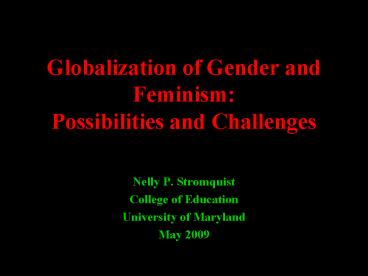Globalization of Gender and Feminism: Possibilities and Challenges - PowerPoint PPT Presentation
1 / 14
Title:
Globalization of Gender and Feminism: Possibilities and Challenges
Description:
Feminism, in contrast, is a political position that ... State retrenchment in many countries. ... State retrenchment reduces support for women's empowerment. ... – PowerPoint PPT presentation
Number of Views:735
Avg rating:3.0/5.0
Title: Globalization of Gender and Feminism: Possibilities and Challenges
1
Globalization of Gender and Feminism
Possibilities and Challenges
- Nelly P. Stromquist
- College of Education
- University of Maryland
- May 2009
2
Significant Distinction
- Gender refers to the social construction of
sexual differences thus, gender studies means
the examination of the consequences of such a
construction. - Feminism, in contrast, is a political position
that seeks to modify and, if possible, undo
gender.
3
Possibilities due to Globalization
- Technological
- Economic
- Political
- Educational
4
Gender--Possibilities due to Globalization
- Technological Dimension
- --Internet and cell phones foster
greater connectivity across social groups and
countries. - --Satellite TV brings news and norms from
around the globe.
5
Gender--Possibilities due to Globalization
- Economic Dimension
- --Greater incorporation of women in the labor
force. - --Womens access to independent income.
- --Greater authority for women within
the household.
6
Gender--Possibilities due to Globalization
- Political Dimension
- --Greater diffusion of human rights values.
- --Greater acceptance of democratic ideas and
practices across nations. - --Increased acceptance of the notion of full
citizenship.
7
Gender--Possibilities due to Globalization
- Education Dimension
- --Global policies EFA, FTI, MDGs.
- --Women registering faster growth than men in
school enrollment. - --Women moving toward parity in higher
education in several developing regions.
8
GenderChallenges brought about by Globalization
- Technological Dimension
- --A sizable gender gap in technology, with
womenhaving less access to the Internet than
men. - --Dominance of men as users, designers,
decision-makers and content-producers. - --Over 70 of the Internet content is
pornographic. - --Technology does not alter the power to make
demands a reality, nor does it increase the
ability to disrupt masculinity.
9
GenderChallenges brought about by Globalization
- Economic Dimension
- --Women are more exposed than men to low
productivity and poorly paid, unstable jobs. - --Competition for jobs suppresses demands for
salaries of comparable worth and decreases time
for political activism among women. - --Uneven economic development is forcing
migration, including that of women. - --Public policies recognize womens
vulnerability but not their roles as economic
players.
10
GenderChallenges brought about by Globalization
- Political Dimension
- --State retrenchment in many countries.
- --With state reduction, less investment in
social services. - --Many responsibilities--caring of children, the
elderly, and the sick--absorbed by women.
11
GenderChallenges brought about by Globalization
- Educational Dimension
- --Discourse of global and national policies
exceeds reality. - --Substantial expansion but low quality.
- --Adult education is a neglected field, with
very few national exceptions. - --Significant under representation of women in
science and technology.
12
FeminismOpportunities brought about by
Globalization
- Feminists today enjoy great connectivity through
Internet capabilities. Ability to produce a
united front among women. - Much greater communication between North and
South activists. - Efficient communication of micro-enterprises with
customers, suppliers, and banks helps small women
entrepreneurs.
13
FeminismChallenges brought about by Globalization
- Under globalization, patriarchy does not go away
but rather emerges in new forms. - ICT policies in many countries are led by
information technologies telecommunications
focuses on business and technological rather than
social issues. - Educational policies give priority to performance
standards, school improvement, higher math,
science, and reading scores. - Emphasis on scientific research leaves little
space for social justice and equity agendas.
14
IN BALANCE
- Paradox of greater connectivity and decreased
political activism among women. - State retrenchment reduces support for womens
empowerment. - Education reoriented toward competition and
production rather than solidarity and social
justice.






![⚡Read✔[PDF] Postcolonial Theory: A Critical Introduction: Second Edition PowerPoint PPT Presentation](https://s3.amazonaws.com/images.powershow.com/10047411.th0.jpg?_=20240604111)
























